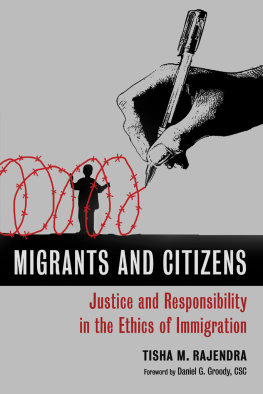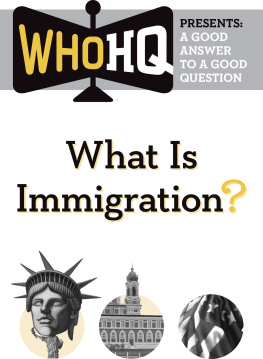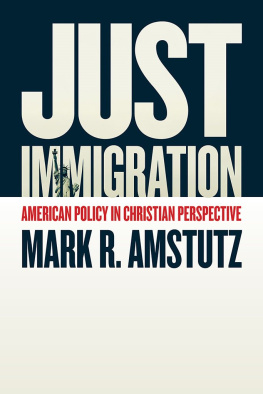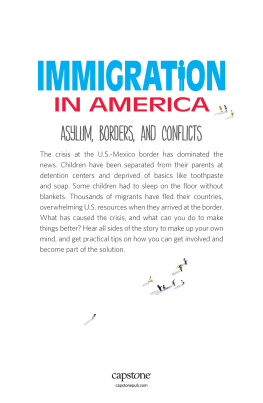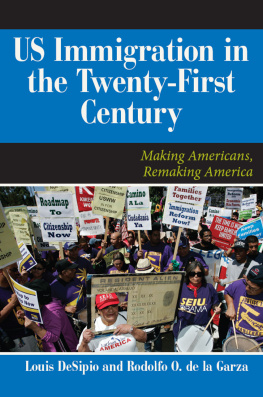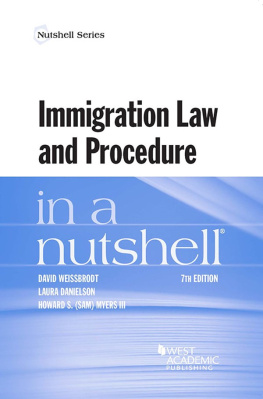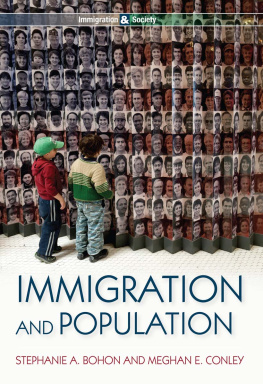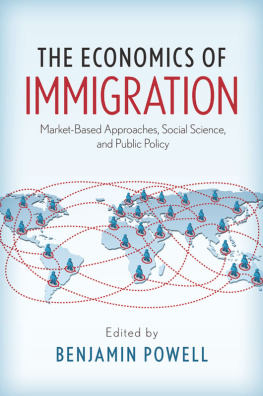Migrants and Citizens
Justice and Responsibility
in the Ethics of Immigration
Tisha M. Rajendra
WILLIAM B. EERDMANS PUBLISHING COMPANY
GRAND RAPIDS, MICHIGAN
Wm. B. Eerdmans Publishing Co.
2140 Oak Industrial Drive N.E., Grand Rapids, Michigan 49505
www.eerdmans.com
2017 Tisha M. Rajendra
All rights reserved
Published 2017
26 25 24 23 22 21 20 19 18 171 2 3 4 5 6 7 8 9 10
ISBN 978-0-8028-6882-4
eISBN 978-1-4674-4880-2
Library of Congress Cataloging-in-Publication Data
Names: Rajendra, Tisha M., 1977- author.
Title: Migrants and citizens : justice and responsibility in the ethics of immigration / Tisha M. Rajendra.
Description: Grand Rapids, Michigan : Eerdmans Publishing Co., 2017. | Includes bibliographical references and index.
Identifiers: LCCN 2017008126 | ISBN 9780802868824 (pbk. : alk. paper)
Subjects: LCSH: Emigration and immigrationMoral and ethical aspects. | Emigration and immigrationReligious aspectsChristianity. | Social justiceReligious aspectsChristianity. | Social ethics. | Christian ethics.
Classification: LCC JV6038 .R34 2017 | DDC 241/.622dc23
LC record available at https://lccn.loc.gov/2017008126
Contents
I wrote this book with the support, in part, of a Summer Research Stipend and a Junior Faculty Research Leave, both from Loyola University of Chicago.
I am extraordinarily grateful to be a part of a vibrant community of theologians and ethicists. Sandra Sullivan Dunbar, Devorah Schoenfeld, Hille Haker, and Maria McDowell have all played a part in my scholarly and intellectual formation. Sandy, Devorah, and Maria all read drafts of various chapters of this book, and it is infinitely better due to their careful reading and insightful critiques. The seeds of the book were developed in my PhD dissertation, which was directed by David Hollenbach. Jeffrey Campbell, my research assistant, helped me with the bibliography. My two editors-in-chief at Eerdmans Publishing Company, Jon Pott and James Ernest, pressed me toward greater clarity and discipline in writing and challenged me to write a book that others would actually want to read. I thank them for their patience during what turned out to be a long process.
A great deal of upheaval, unrelated to the writing process, accompanied the writing of this book. The friendship and assistance of so many made it possible for me to continue writing through the turmoil. In particular, I wish to thank Nicholas E. Morrell and his team at Morgan Lewis, Neela Rajendra, Denise Nepveux, Claire Purkis, M. T. Dvila, Ramn Luzrraga, Aana Vigen, Catherine Wolf, and Susan Ross, the chair of the Department of Theology at Loyola.
My husband, co-parent, and life partner, Dana Houle, has unfailingly believed that I had something worth saying. The uneven distribution of child-care responsibilities in our household enabled me to say it. Our children, Julian and Miriam, born while I was writing this book, make me laugh every single day. Finally, I wish to thank my parents, Clement and Subi Rajendra, my first teachers of justice and responsibility.
In the summer of 2013, hundreds of refugees packed onto a rickety boat on the shores of the Libyan coast and ventured forth into the open sea. They were fleeing social unrest, political persecution, and human rights abuses and hoped to find a safe place to land, anywhere that would receive them. While en route their vessel capsized, and most of them drowned in the middle of the Mediterranean. A few survived the shipwreck by clinging to the fishing nets of a nearby Tunisian boat, and when they saw fishermen in the distance, they pleaded desperately to be saved. When the fishermen saw them holding on to their lines, however, they cut them loose and sent them to die in the ocean depths.
One of those who heard about this story was the newly elected Pope Francis. He was so moved by their plight that he wanted to make a gesture of closeness with these refugees and to challenge the conscience of the world, lest this tragedy be repeated. Eight days later he made his first pastoral visit outside of the Vatican to the small and isolated Italian island of Lampedusa, located in the middle of the waters between Africa and Europe. More than 5,000 died in these waters in 2016,
Shortly after arriving, Pope Francis celebrated the Eucharist near the island harbor, next to a boat graveyard, where the remains of migrant ships pile up. In preparation for the mass, a local carpenter crafted the altar from a migrant boats hull, the lectern from ships rudders, and the chalice from driftwood of downed vessels. Through words, gestures, and symbols Pope Francis reminded us of the integral relationship between the bodies of these refugees and the body of Christ and our call to solidarity with the least and the last among us. Amidst a world growing increasingly indifferent to their plight, he sought to weave a renewed narrative in society about who God is, who we are, and who we are called to be to each other.
In dramatic contrast to this narrative, Donald Trump has sought to weave a different one, especially about migrants, refugees, and our response to them. Shortly after launching his campaign he said, When Mexico sends its people, theyre not sending their best.... Theyre not sending you. Theyre sending people that have lots of problems, and theyre bringing those problems with us. Theyre bringing drugs. Theyre bringing crime. Theyre rapists. And some, I assume, are good people. Even when presented with a mountain of empirical data and research to the contrary, Trump and his supporters continued to advance this narrative. Not only was it politically expedient, but it also spoke to the fears and insecurities of many people, who wanted some remedy to social upheaval, economic uncertainty, and a weakening sense of national identity. After he was elected, Trump sought to translate that narrative into public policy by initiating a series of executive orders aimed at excluding refugees and directed toward building a beautiful wall that would separate us from them.
The narrative of Pope Francis and the narrative of Donald Trump highlight two different ways of interpreting and responding to the complex challenges posed by global migration. In between these two narratives, there is much conflict, controversy, and confusion, which points to the need not only for more information but for a new imagination about how to think about it. This profound and thoughtful work by Tisha Rajendra seeks to take on this challenge, and she goes to the heart of the issue when she asks probing questions about the quality of our relationships. In particular she challenges us to consider the question, who is responsible for protecting migrants? This question is not easy to resolve, and the present context that divides the narrative into traditional dualisms like citizen/alien, legal/illegal, and native/foreigner have broken down. Not only do these categories not work but they also create waves of injustice that force countless individuals into the shadows of society and make them vulnerable to being exploited on the merciless sea of human indifference.
As she helps us untangle the complex challenges posed by migration, Rajendra not only gives us a way of understanding the conceptual terrain of migration but also addresses the cognitive, spiritual, and ethical undercurrent that shapes our moral imagination. At the heart of her reflection is the search for a more life-giving narrative that moves us from social fragmentation to right relationships. Because narratives within us continually govern our thoughts, our actions, and our policies, she helps us examine new ways of thinking about immigrants that move us beyond the politics of otherness and toward a vision of oneness.

